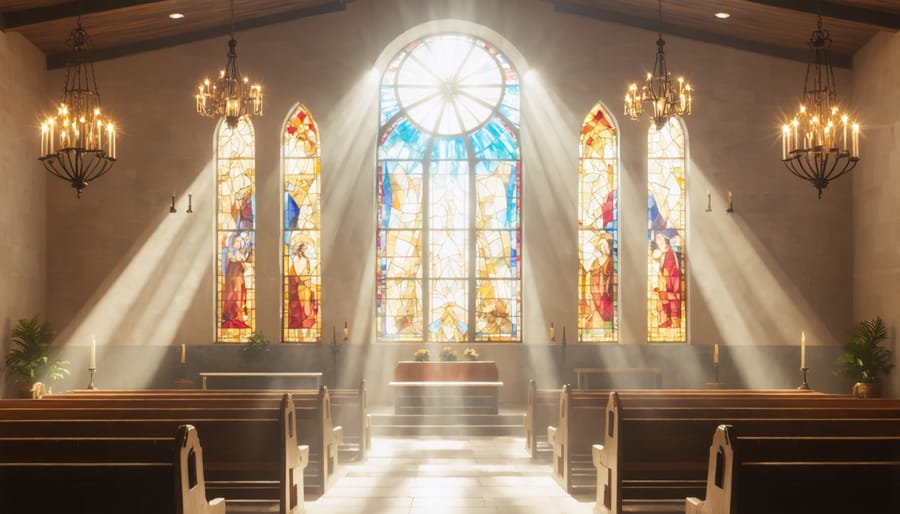Discover the transformative benefits of spiritual retreats as you embark on a sacred journey of renewal and deeper connection with God. In today’s fast-paced world, Christian spiritual retreats offer a precious opportunity to step away from daily distractions and enter into meaningful communion with the Divine. Whether you’re seeking personal revival, spiritual clarity, or a closer walk with Christ, this comprehensive guide will walk you through creating a purposeful retreat experience that nurtures your faith and refreshes your soul.
Drawing from centuries of Christian contemplative tradition and modern retreat practices, we’ll explore practical steps to plan, prepare, and participate in a spiritual retreat that aligns with biblical principles. From selecting the perfect location and crafting a spirit-led schedule to incorporating essential spiritual disciplines like prayer, meditation on Scripture, and holy silence, this guide provides the framework for a transformative encounter with God. Let the words of Psalm 46:10 guide our journey: “Be still, and know that I am God.”

Planning Your Spiritual Retreat Experience
Choosing Your Retreat Focus
When selecting your retreat focus, consider what area of your spiritual life needs the most nurturing. Prayer retreats offer dedicated time to develop your communication with God, drawing inspiration from Psalm 46:10: “Be still, and know that I am God.” These retreats emphasize silence, meditation, and deepening your prayer life.
Bible study retreats help you dive deeper into Scripture, providing structured time for thorough examination and reflection on God’s Word. These are particularly beneficial if you’re seeking to strengthen your biblical foundation or explore specific themes in Scripture.
Worship-focused retreats center on praise and adoration, allowing you to experience God’s presence through music, dance, and creative expression. These retreats can reignite your passion for worship and help you discover new ways to glorify God.
Healing and restoration retreats provide space for emotional and spiritual renewal, perfect for those going through challenging seasons or seeking inner healing. They often incorporate counseling, prayer ministry, and supportive community elements.
Community-building retreats emphasize fellowship and relationship-building with other believers, following the model of the early church in Acts. These retreats are ideal for those seeking to strengthen their connections within the body of Christ.
Consider your current spiritual season and what would most benefit your walk with God. Pray for guidance, and don’t hesitate to seek counsel from spiritual mentors when choosing your retreat focus.
Setting Sacred Time and Space
Creating sacred time and space is essential for a meaningful spiritual retreat. Begin by selecting a specific time frame that allows you to fully disconnect from daily responsibilities. Whether it’s a weekend or just a day, mark this time as holy and protected from interruptions. As Jesus often withdrew to quiet places to pray (Luke 5:16), we too need dedicated time for spiritual renewal.
Choose a space that promotes peace and contemplation. This could be a quiet room in your home, a peaceful outdoor setting, or a designated retreat center. Remove distractions by silencing your phone and clearing the area of items that might compete for your attention. Consider incorporating meaningful Christian symbols like a cross, Bible, or prayer journal to help focus your thoughts on God.
Create an atmosphere that engages your senses in worship. Soft instrumental worship music can help set a reverent mood. Natural light or gentle candlelight can create a peaceful ambiance. Some find it helpful to use sacred scents like frankincense or myrrh, connecting to biblical traditions while creating a distinctive environment for prayer.
Establish a simple prayer corner with comfortable seating and good lighting for reading Scripture. Remember Solomon’s wisdom in Ecclesiastes 3:1, “There is a time for everything.” By intentionally setting aside this time and space, you’re creating a sanctuary for intimate communion with God.
Essential Elements of a Spiritual Retreat
Prayer and Meditation Practices
During your spiritual retreat, incorporating diverse prayer and meditation techniques can help deepen your connection with God. Begin each day with centering prayer, finding a quiet space where you can be still before the Lord. As Psalm 46:10 reminds us, “Be still, and know that I am God.”
Consider practicing lectio divina, a contemplative way of reading Scripture where you slowly meditate on God’s Word, allowing it to speak to your heart. Choose a short passage and read it multiple times, pausing to reflect on what the Holy Spirit might be revealing to you.
Incorporate both structured and spontaneous prayer times throughout your retreat. Try the ACTS method (Adoration, Confession, Thanksgiving, Supplication) for structured prayer sessions, or simply pour out your heart to God in conversation. Walking prayers can also be powerful, combining gentle physical movement with spiritual reflection.
Silent meditation periods are valuable for listening to God’s voice. Start with short intervals of 10-15 minutes and gradually extend the duration as you become more comfortable with stillness. Keep a prayer journal to record your insights, questions, and experiences of God’s presence.
Remember that Jesus often withdrew to quiet places to pray (Luke 5:16). Follow His example by creating intentional spaces for communion with God during your retreat.

Scripture Study and Reflection
During your retreat, Scripture study becomes a powerful tool for encountering God’s presence and wisdom. Begin by selecting meaningful passages that resonate with your retreat’s theme or your current spiritual journey. Consider starting with the Psalms for reflection on praise and lament, the Gospels for Jesus’s teachings, or epistles for practical spiritual guidance.
Create a peaceful environment for your Bible study time. Find a quiet spot, perhaps outdoors if weather permits, and have your Bible, journal, and writing materials ready. Before reading, take a few moments to pray, asking the Holy Spirit for guidance and understanding.
Practice the lectio divina method: read the passage slowly several times, meditate on specific verses that stand out, pray about what God is revealing to you, and contemplate how to apply these insights to your life. Write down your observations, questions, and personal reflections in your journal.
Consider using the SOAP method (Scripture, Observation, Application, Prayer) to structure your study time. This helps you dive deeper into the text’s meaning and personal application. You might also try Bible journaling, which combines creative expression with Scripture meditation.
Remember that Scripture study isn’t about quantity but quality. Take time to sit with challenging passages, celebrate moments of clarity, and allow God’s Word to transform your heart and mind. Share your insights with others if you’re on a group retreat, as this can provide new perspectives and strengthen community bonds.
Journaling and Personal Reflection
Journaling during your spiritual retreat creates a sacred space for meaningful Christian reflection and documenting your journey with God. Begin each journal entry with a prayer, inviting the Holy Spirit to guide your thoughts and revelations. Consider structuring your entries using the SOAP method: Scripture, Observation, Application, and Prayer.
Record the Bible verses that speak to your heart during your retreat, noting how God’s Word resonates with your current life circumstances. Express your honest thoughts, questions, and emotions – remember that David poured out both his joys and laments in the Psalms. Include specific prayer requests, answered prayers, and moments where you felt God’s presence particularly strong.
Consider these prompting questions for deeper reflection:
– What is God teaching me during this time of solitude?
– How has my understanding of His love grown?
– What areas of my life need surrender and transformation?
– What spiritual gifts am I being called to develop?
Make your journaling time intentional by setting aside a specific period each day during your retreat. Find a quiet spot where you can write without interruption. Your journal becomes a testimony of your spiritual journey, something you can revisit to witness God’s faithfulness and your growth in faith.
Remember to date your entries and consider including Scripture memorization, worship song lyrics, or sketches that represent your spiritual insights. This personal record will become a treasured reminder of your retreat experience and God’s ongoing work in your life.
Creating a Daily Retreat Schedule

Morning Devotional Practices
Begin each retreat day by creating a sacred space for intimate communion with God. As the morning sun rises, embrace the stillness and dedicate your first moments to prayer and reflection. Start with a gentle breathing exercise, acknowledging God’s presence and allowing His peace to fill your heart.
Scripture meditation forms the cornerstone of morning devotions. Select a Bible passage that resonates with your retreat’s theme and spend time studying it deeply. Consider journaling your insights, questions, and personal applications. Remember Jesus’s example of early morning prayer: “Very early in the morning, while it was still dark, Jesus got up, left the house and went off to a solitary place, where he prayed” (Mark 1:35).
Incorporate worship through music, whether through quiet listening or gentle singing. Traditional hymns or contemporary praise songs can help align your heart with God’s presence. Follow this with intentional thanksgiving, expressing gratitude for specific blessings and God’s faithfulness.
Consider including contemplative practices such as lectio divina or centering prayer. These ancient Christian disciplines can deepen your connection with Scripture and enhance your awareness of God’s presence. End your morning devotional time by setting spiritual intentions for the day ahead, perhaps choosing a verse or truth to carry with you.
Remember, this sacred morning routine sets the tone for your entire retreat day, creating space for profound spiritual growth and renewal.
Evening Reflection and Rest
As the day draws to a close, create a peaceful environment for reflection and rest. Begin by dimming the lights and finding a quiet space where you can be alone with God. Take time to journal about your retreat experiences, noting any revelations, answered prayers, or moments where you felt God’s presence particularly strongly.
Scripture reminds us, “Be still, and know that I am God” (Psalm 46:10). This evening time is perfect for practicing this stillness. Consider reading a calming passage from Psalms or spending time in grateful prayer, thanking God for the blessings of the day.
Review your spiritual insights and commitments made during the retreat. Write down any action steps you want to implement in your daily life moving forward. This helps bridge the retreat experience with your regular routine.
Prepare for rest by engaging in a brief evening devotion. You might light a candle, play soft worship music, or simply sit in contemplative silence. Remember Jesus’s words, “Come to me, all you who are weary and burdened, and I will give you rest” (Matthew 11:28).
End your evening with a prayer of surrender, releasing any concerns to God’s care. Consider using this time to practice the ancient Christian practice of the Examen, reviewing your day with gratitude and awareness of God’s presence. Allow yourself to drift into sleep with a peaceful heart, knowing that “in peace I will lie down and sleep, for you alone, Lord, make me dwell in safety” (Psalm 4:8).
After the Retreat: Sustaining Spiritual Growth
The journey of spiritual growth doesn’t end when you return home from your retreat. In fact, the retreat experience should serve as a catalyst for lasting transformation in your daily walk with Christ. To maintain and build upon the spiritual insights gained during your retreat, focus on developing a strong prayer practice that reflects the intimacy you experienced with God during your time away.
Create a structured plan to implement the spiritual disciplines and practices you learned during the retreat. Set aside specific times each day for Bible study, meditation, and prayer, even if they’re shorter than what you experienced during the retreat. Remember Jesus’s words in Matthew 6:6, “But when you pray, go into your room, close the door and pray to your Father, who is unseen.”
Consider keeping a spiritual journal to document your ongoing journey, recording prayers, Scripture reflections, and ways God is working in your life. This practice helps maintain the spiritual momentum gained during the retreat and provides encouragement during challenging times.
Stay connected with fellow retreat participants or find accountability partners in your local church community. Regular fellowship can help sustain the spiritual growth you experienced. As Hebrews 10:24-25 reminds us, “Let us consider how we may spur one another on toward love and good deeds, not giving up meeting together.”
Integrate retreat-inspired practices into your daily routine gradually. Start with one or two meaningful changes rather than attempting to maintain everything at once. This might mean beginning each day with a devotional, incorporating regular fasting, or setting aside weekly quiet time for extended prayer and reflection.
Remember that spiritual growth is a journey, not a destination. There will be peaks and valleys, but the key is maintaining consistent communion with God. Let your retreat experience serve as a touchstone to return to when you need renewal and inspiration in your daily walk with Christ.
Spiritual retreats offer a transformative pathway to deepening your relationship with God and rejuvenating your faith journey. Through intentional time spent in prayer, reflection, and communion with the Lord, you can experience profound spiritual growth and renewed purpose. As Jesus often withdrew to quiet places to pray (Luke 5:16), we too can find restoration and clarity through these sacred moments of retreat. Whether you choose a personal day of solitude or join a guided group experience, the impact of stepping away from daily distractions to focus on your spiritual life can be life-changing. Remember, every journey begins with a single step. Don’t wait for the perfect moment – begin planning your spiritual retreat today. Let the Holy Spirit guide you as you create space for God to work in your heart and transform your life. The peace, wisdom, and spiritual refreshment you’ll discover are invaluable gifts waiting to be unwrapped.
